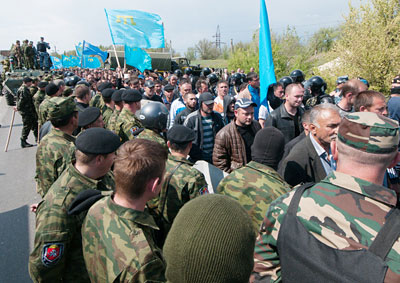(lead article)
Ukraine workers fight
to defend sovereignty
Tatars resist Moscow occupation of Crimea

|
|
AP/Alexander Polegenko
|
|
Crimean Tatars march May 3 to Russian checkpoint at Crimean border, demanding Tatar leader Mustafa Dzhemilev be allowed to enter peninsula, but Russian government officials refused.
|
BY JOHN STUDER
Agents of the Russian military and local recruits, which include criminal gangs, have stepped up provocations across Ukraine’s eastern and southern regions, laying the ground for direct intervention by Moscow.
Workers, youth and others have joined demonstrations in support of Ukrainian sovereignty. Some 3,000 people marched May 4 in Dnepropetrovsk, many of whom gathered for a soccer match there featuring the Ukrainian Premier League teams from the home city and Lviv in the west. Among the chants by fans from both sides were “East and West together” and “Glory to Ukraine.”
Soccer fans from all across the country, including from the Donetsk Shakhtar (Miner) team, Kharkiv Metalist (Metalworkers), and other cities in the east, have taken part in pro-Ukrainian demonstrations and volunteer self-defense units.
More than 1,000 marched in Odessa May 2, including fans of both the local Chernomorets (Sailors) team and the visiting Metalists from Kharkiv, who were playing later that day. The supporters of Ukrainian unity were set upon by a couple hundred armed supporters of Russian annexation.
“The soccer fans were unarmed — they were marching with Ukrainian flags, while the opposite side appeared fully geared as if they came for war,” journalist Zoya Kazandzhy told the Kiev Post. “Citizens quickly organized themselves and that’s the only thing that helped us yesterday.”
As outnumbered attackers began retreating, they opening fire with Kalashnikovs and pistols. A young football fan was fatally shot.
After a more than one-hour battle, the vigilantes fled into the nearby Trade Union building. The two sides continued to hurl Molotov cocktails and other projectiles at each other and the building caught on fire. Led by self-defense units, supporters of Ukrainian sovereignty rescued several dozen attackers by bringing a scaffold up to the wall so they could escape safely from windows on the second and third floor. Self-defense forces also protected escaping provocateurs from angry demonstrators seeking retribution for the attack on their action.
Ukrainian government authorities report 46 dead, eight from the street violence and the rest from the burning building. Hundreds were injured. Of the bodies recovered from the building, 15 were Russian citizens and five from the Russian-occupied breakaway region of Transnitsia in nearby Moldova, according to the Kiev Post.
Ukrainian cops, who stood aside during the melee, arrested more than 100 pro-Moscow attackers who were still on the roof after the fire department arrived more than an hour after the fire started.
On May 4, anti-Ukraine gangs attacked the police station, and the cops released those in custody.
Russian government-controlled media twisted the events of May 2 to smear supporters of Ukrainian sovereignty and fuel further provocations.
Moscow’s line is that the mass mobilizations that in February overthrew Ukrainian President Viktor Yanukovych were comprised of fascist anti-Semites operating under orders from Washington with the goal of provoking war between Ukraine and Russia.
RT, an English-language pro-Russian news media, ran an interview with Serbian historian Nebojsa Malic May 5 promoting a fantastic conspiracy claiming that those who attacked the pro-Ukrainian rally were not pro-Moscow forces, but “Right Sector people deployed to Odessa in order to both create a powerful atrocity to draw Russia into open conflict and intimidate any sort of population that is against the coup government [the interim Ukrainian government that replaced the Yanukovych regime] by saying, ‘Look, if you continue opposing us, we’ll murder you in the most gruesome manner possible.’”
At the same time, pro-Moscow annexationist forces continue to occupy government buildings in Donetsk, Luhansk, Slovyansk and other eastern cities. Ukrainian army units are attempting to isolate them in preparation for retaking the buildings.
In an anti-working-class slant typical of the U.S. big-business media, the Wall Street Journal described the May 2 events in Odessa as “rioting between pro- and anti-government mobs,” and called the Russian military operatives and thugs under their direction “assorted activists opposed to Kiev.”
Tatars mobilize for Ukraine
The Russian government’s operation in east and south Ukraine echoes Moscow’s seizure of Crimea in March, where paramilitary thugs took over government buildings to create a pretext for an invasion by thousands of Russian troops, followed by a fraudulent referendum for “independence” at gunpoint to justify incorporation of the peninsula into Russia.
The Crimean Tatars, among Crimea’s earliest inhabitants who today comprise some 12 percent of the peninsula’s population, refused in their great majority to participate in the referendum. Moscow responded by barring the central leader of the Tatars, Mustafa Dzhemilev, from his Crimean homeland.
Dzhemilev drove to Crimea May 3, but was stopped at the border by Russian troops. Some 5,000 Tatars met him by the border, where they rallied in his support and against Russian occupation.
May 18 will be the 70th anniversary of the deportation of the entire Crimean Tatar population on orders of then Soviet Premier Joseph Stalin, who slandered them en masse as agents of Adolf Hitler. Almost half the population died in the forced journey to Uzbekistan and other parts of the Soviet Union. Tatars began to return in large numbers in the 1990s.
“I plan to go to Crimea and try to get there on May 18,” Dzhemilev told a press conference in Kiev May 5. “It would be most prudent of the Crimean authorities to let me in.”
“Discriminatory laws have never stopped Crimean Tatars in the past,” he said. “Crimean Tatars are the fulcrum of resistance against the regime of occupation. We will not condone the occupation.”
| 


